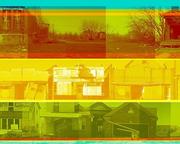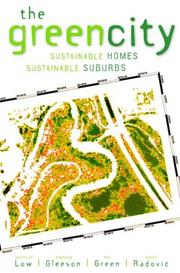| Listing 1 - 10 of 23 | << page >> |
Sort by
|

ISBN: 0521265444 Year: 9999 Publisher: Cambridge Cambridge University press
Abstract | Keywords | Export | Availability | Bookmark
 Loading...
Loading...Choose an application
- Reference Manager
- EndNote
- RefWorks (Direct export to RefWorks)
City and town life --- Urban ecology (Sociology) --- Cities and towns --- Urban ecology --- Urban environment --- Social ecology --- Sociology, Urban --- City life --- Town life --- Urban life --- Psychological aspects --- Environmental aspects --- Social psychology --- Sociology of environment

ISBN: 962860404X Year: 2005 Publisher: Hong Kong Map Book Publishers
Abstract | Keywords | Export | Availability | Bookmark
 Loading...
Loading...Choose an application
- Reference Manager
- EndNote
- RefWorks (Direct export to RefWorks)
Under the confluence of nomadic economics, technologies, and industries--commonly known as "suburban sprawl"--the city of Detroit, segregated and isolated, constitutes one of the great monuments to decay by a modernist city. It is perhaps the clearest and earliest example of the effects of a globalized economy and labor market. Urban Ecology contains a collection of projects generated by the International Center for Urban Ecology (iCUE), a nomadic laboratory for future cities. Since its founding in 1998 by Kyong Park, iCUE has accomplished five significant projects through international workshops like "Architecture of Resistance," installations, videos, and urban designs. The laboratory investigation promotes discourse on the decomposition and possible reconstitution of a "moving city"--a more useful term through which to identify a city like Detroit. iCUE's projects have taken anti-architectural and non-urban perspectives, using multi-disciplinary processes and integrated collaboration with local communities and activists. Urban Ecology brings together essays on Detroit and many other cities in crisis around the world.
Environmental planning --- Architecture --- ecology --- urban development --- 711.4 --- Detroit --- Michigan --- iCUE --- International Center for Urban Ecology --- Stedenbouw
Periodical
Abstract | Keywords | Export | Availability | Bookmark
 Loading...
Loading...Choose an application
- Reference Manager
- EndNote
- RefWorks (Direct export to RefWorks)
Cities and towns --- Municipal government --- Urban ecology (Sociology) --- Cities and towns. --- Municipal government. --- Canada. --- Social Sciences --- Anthropology --- Communities and Urban Planning --- General and Others --- Public Policy & Administration
Book
ISBN: 9780198836858 9780198836841 0198836856 0198836848 Year: 2020 Publisher: Oxford : Oxford University Press,
Abstract | Keywords | Export | Availability | Bookmark
 Loading...
Loading...Choose an application
- Reference Manager
- EndNote
- RefWorks (Direct export to RefWorks)
Urban Evolutionary Biology fills an important knowledge gap on wild organismal evolution in the urban environment, whilst offering a novel exploration of the fast-growing new field of evolutionary research. The growing rate of urbanization and the maturation of urban study systems worldwide means interest in the urban environment as an agent of evolutionary change is rapidly increasing.We are presently witnessing the emergence of a new field of research in evolutionary biology. Despite its rapid global expansion, the urban environment has until now been a largely neglected study site among evolutionary biologists. With its conspicuously altered ecological dynamics, it stands in stark contrast to the natural environments traditionally used as cornerstones for evolutionary ecology research.Urbanization can offer a great range of new opportunities to test for rapid evolutionary processes as a consequence of human activity, both because of replicate contexts for hypothesis testing, but also because cities are characterized by an array of easily quantifiable environmental axes of variation and thus testable agents of selection. Thanks to a wide possible breadth of inference (in terms of taxa) that may be studied, and a great variety of analytical methods, urban evolution has the potential to stand at a fascinating multi-disciplinary crossroad, enriching the field of evolutionary biology with emergent yet incredibly potent new research themes where the urban habitat is key.Urban Evolutionary Biology is an advanced textbook suitable for graduate level students as well as professional researchers studying the genetics, evolutionary biology, and ecology of urban environments. It is also highly relevant to urban ecologists and urban wildlife practitioners.
Evolution. Phylogeny --- General ecology and biosociology --- Urban animals. --- Biology. --- Animals. --- Biological Evolution. --- Ecology. --- Evolution (Biology). --- Urban animals --- Urban ecology (Biology). --- Urbanization. --- Écologie urbaine. --- Évolution (biologie).
Periodical
ISSN: 09562478 Publisher: Paris
Abstract | Keywords | Export | Availability | Bookmark
 Loading...
Loading...Choose an application
- Reference Manager
- EndNote
- RefWorks (Direct export to RefWorks)
Sociology of environment --- Environmental protection. Environmental technology --- Urban ecology (Sociology) --- Sociology, Urban --- Urbanization --- Ecologie urbaine --- Sociologie urbaine --- Urbanisation --- Periodicals --- Periodicals. --- Périodiques --- Developing countries --- Pays en développement --- Social conditions --- Conditions sociales --- Urban ecology --- Milieu. --- Urbanisatie. --- 2. --- Environmental Sciences --- Social Sciences --- Environmental Planning & Studies --- Anthropology --- Développement économique --- Écologie urbaine --- Aspect environnemental
Periodical
Abstract | Keywords | Export | Availability | Bookmark
 Loading...
Loading...Choose an application
- Reference Manager
- EndNote
- RefWorks (Direct export to RefWorks)
Environmental planning --- General ecology and biosociology --- Environmental protection. Environmental technology --- Urban ecology (Sociology) --- Urban forestry --- Urban policy --- Trees in cities --- Ecologie urbaine --- Foresterie urbaine --- Politique urbaine --- Arbres dans les villes --- Periodicals --- Periodicals. --- Périodiques --- Urban ecology (Biology) --- Écologie urbaine --- Urban forestry. --- Urban policy. --- Environmental Sciences --- Life Sciences --- Ecosystems & Ecology --- Biology --- Ecology
Periodical
Abstract | Keywords | Export | Availability | Bookmark
 Loading...
Loading...Choose an application
- Reference Manager
- EndNote
- RefWorks (Direct export to RefWorks)
Sustainable urban development --- Sustainable buildings --- Urban ecology (Sociology) --- Sustainable buildings. --- Sustainable urban development. --- Urban environment --- Cities and towns --- Urban ecology --- Environmentally sustainable urban development --- Ecologically sustainable buildings --- Environmentally sustainable buildings --- Green buildings (Green technology) --- Environmental aspects --- Social ecology --- Sociology, Urban --- City planning --- Sustainable development --- Buildings --- Environmental Sciences --- Social Sciences --- Sustainable Development --- Communities and Urban Planning
Periodical
ISSN: 09763546 09754253
Abstract | Keywords | Export | Availability | Bookmark
 Loading...
Loading...Choose an application
- Reference Manager
- EndNote
- RefWorks (Direct export to RefWorks)
Social ecology --- Urban ecology (Sociology) --- Urbanization --- Human ecology --- Human ecology. --- Social ecology. --- Urbanization. --- Asia. --- Cities and towns, Movement to --- Urban development --- Urban systems --- Urban environment --- Cities and towns --- Urban ecology --- Ecology, Social --- Environment, Human --- Human ecology (Social sciences) --- Human environment --- Ecology --- Human beings --- Environmental aspects --- Social aspects --- Asian and Pacific Council countries --- Social history --- Sociology, Rural --- Sociology, Urban --- Urban policy --- Rural-urban migration --- Social sciences --- Ecological engineering --- Human geography --- Nature --- Effect of environment on --- Effect of human beings on --- Eastern Hemisphere --- Eurasia
Book
ISBN: 9780262535656 9780262038225 9780262347471 0262347474 Year: 2018 Publisher: Cambridge : The MIT Press,
Abstract | Keywords | Export | Availability | Bookmark
 Loading...
Loading...Choose an application
- Reference Manager
- EndNote
- RefWorks (Direct export to RefWorks)
The possibility of a new emancipatory and democratizing politics, explored through the lens of recent urban insurgencies . In Promises of the Political , Erik Swyngedouw explores whether progressive and emancipatory politics is still possible in a post-political era. Activists and scholars have developed the concept of post-politicization to describe the process by which "the political" is replaced by techno-managerial governance. If the political domain has been systematically narrowed into a managerial apparatus in which consensual governance prevails, where can we find any possibility of a new democratic politics? Swyngedouw examines this question through the lens of recent urban insurgencies. In Zuccotti Park, Paternoster Square, Taksim Square, Tahrir Square, Hong Kong, and elsewhere, he argues, insurgents have gathered to choreograph new configurations of the democratic. Swyngedouw grounds his argument in urban and ecological processes, struggles, and conflicts through which post-politicization has become institutionally entrenched. He casts "the city" and "nature" as emblematic of the construction of post-democratic modes of governance. He describes the disappearance of the urban polis into the politics of neoliberal planetary urbanization; and he argues that the political-managerial framing of "nature" and the environment contributes to the formation of depoliticized governance -- most notably in the impotent politics of climate change. Finally, he explores the possibilities for a reassertion of the political, considering whether -- after the squares are cleared, the tents folded, and everyday life resumes -- the urban uprisings of the last several years signal a return of the political.
Sociologie van de politiek --- Social change --- Political sociology --- Community organization --- Urban ecology (Sociology) --- Political ecology --- Populism --- Radicalism --- Political participation --- History --- URBANISM/General --- ENVIRONMENT/General --- SOCIAL SCIENCES/Sociology --- Citizen participation --- Community action --- Community involvement --- Community participation --- Involvement, Community --- Mass political behavior --- Participation, Citizen --- Participation, Community --- Participation, Political --- Political activity --- Political behavior --- Political rights --- Social participation --- Political activists --- Politics, Practical --- Extremism, Political --- Ideological extremism --- Political extremism --- Political science --- Social ecology --- Green movement --- Cities and towns --- Urban ecology --- Urban environment --- Sociology, Urban --- Environmental aspects

ISBN: 0429236328 1283844621 1136753001 0203820827 9781136753008 9780203820827 0415372313 9780203820827 9780415372312 9781136752957 9781136752995 9781138141513 0868406937 9780429236327 9781283844628 Year: 2005 Publisher: Sydney : Abingdon, Oxfordshire ; New York : UNSW Press ; Routledge/Taylor & Francis,
Abstract | Keywords | Export | Availability | Bookmark
 Loading...
Loading...Choose an application
- Reference Manager
- EndNote
- RefWorks (Direct export to RefWorks)
A team of city-building professionals explain in straightforward terms how the idea of ecological sustainability can be embodied in the everyday life of homes, communities and cities to make a better future.The book considers - and answers - three questions: What does the global agenda of sustainable development mean for the urban spaces where most people live, work and move? Can we keep what we love about suburban life and still save the environment? And what new methods of planning and building will be needed in the 21st century? Rejecting both economic and environmental or
Urban ecology (Sociology) --- Sustainable development. --- Urban policy. --- Cities and state --- Urban problems --- City and town life --- Economic policy --- Social policy --- Sociology, Urban --- City planning --- Urban renewal --- Development, Sustainable --- Ecologically sustainable development --- Economic development, Sustainable --- Economic sustainability --- ESD (Ecologically sustainable development) --- Smart growth --- Sustainable development --- Sustainable economic development --- Economic development --- Cities and towns --- Urban ecology --- Urban environment --- Social ecology --- Environmental aspects --- Environmental planning --- Architecture --- urban development --- durability --- sustainable architecture
| Listing 1 - 10 of 23 | << page >> |
Sort by
|

 Search
Search Feedback
Feedback About
About Help
Help News
News